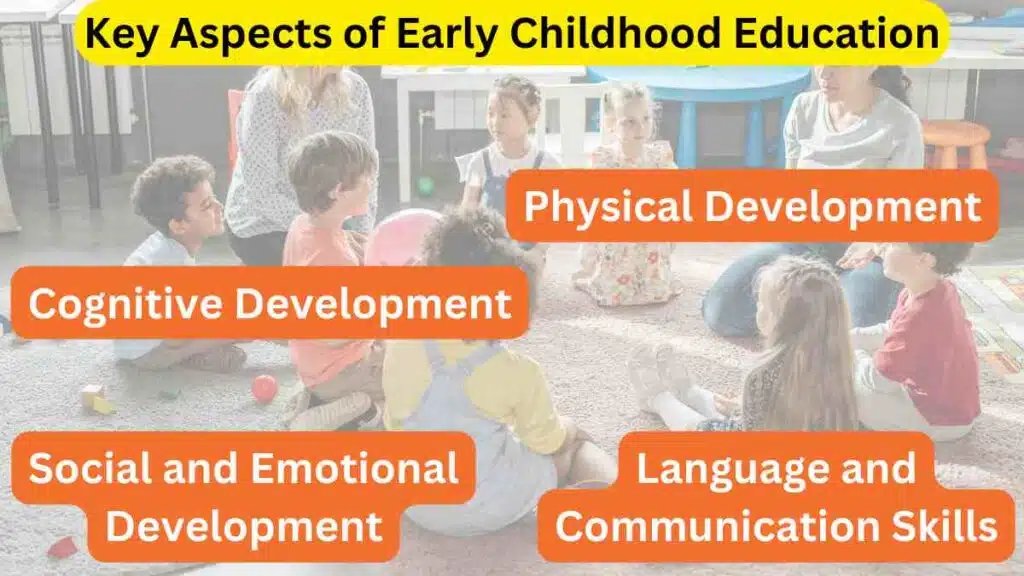Early Childhood Education-Key Aspects, And Benefits
Early Childhood Education is a fundamental stepping stone for a child’s holistic development. It lays the groundwork for academic success, social well-being, and personal growth. Investing in ECE is not only an investment in individual children but also in the future of society as a whole.
Key Aspects of Early Childhood Education

Cognitive Development
During the early years children’s brains are rapidly developing and they are highly receptive to learning. ECE programs focus on stimulating cognitive development through activities that promote critical thinking, problem-solving, and decision-making skills.
Social and Emotional Development
Early childhood is a period when children learn to interact with others and develop emotional awareness. ECE fosters social skills, empathy, and emotional resilience, laying the groundwork for healthy relationships later in life.
Physical Development
Physical development is essential for a child’s overall well-being. ECE incorporates activities that enhance fine and gross motor skills, promoting a healthy lifestyle and body awareness.
Language and Communication Skills
Language is a vital tool for expression and understanding. ECE emphasizes language development through storytelling, reading, and engaging in conversations, supporting language fluency and vocabulary expansion.
Benefits of Early Childhood Education
Improved Academic Performance
Children who receive a quality early education demonstrate better academic performance in later years. ECE programs prepare them for formal schooling by cultivating a love for learning and building a strong educational foundation.
Enhanced Social Skills
ECE provides opportunities for children to interact with peers and adults, fostering essential social skills such as communication, cooperation, and conflict resolution.
Long-term Positive Effects
Studies have shown that children who participate in ECE programs are more likely to have positive outcomes in adulthood, including higher educational attainment, better job prospects, and reduced involvement in criminal activities.
Effective Teaching Approaches in ECE
Play-based Learning
Play is a natural way for children to explore and make sense of the world around them. ECE incorporates play-based learning, where children engage in various activities that promote creativity, problem-solving, and social skills development.
Child-Centered Approach
In a child-centered ECE setting, educators tailor their teaching methods to meet the unique needs and interests of each child, allowing them to learn at their own pace and style.
Individualized Attention
ECE teachers provide individualized attention to each child, identifying their strengths and areas for improvement. This personalized approach maximizes learning outcomes and boosts self-confidence.
Challenges and Solutions in Early Childhood Education
Access and Affordability
Ensuring equitable access to quality ECE programs can be challenging, especially for disadvantaged communities. To address this, governments and organizations must invest in initiatives that provide affordable or free ECE services.
Quality of Education
Maintaining high standards of education is crucial for the success of ECE programs. Regular evaluations, professional development for teachers, and curriculum enhancements can help maintain and improve quality.
Parental Involvement
Engaging parents in their child’s education can be a challenge. Schools can bridge this gap by organizing parent workshops, and communication sessions, and involving parents in decision-making processes.
The Impact of Technology on ECE
Pros and Cons of Technology Integration
Technology can enhance ECE by providing interactive learning tools and resources. However, excessive screen time may have adverse effects. Striking the right balance is essential for reaping the benefits of technology.
Balancing Screen Time
ECE providers and parents must monitor and control screen time to ensure that it complements the child’s overall learning experience without replacing essential hands-on activities.
Early Childhood Education around the World
Different countries adopt various approaches to ECE. Some focus on structured formal education, while others emphasize play-based learning. Understanding these diverse practices can inspire innovation and improvement.
Global Initiatives for ECE
International organizations like UNESCO and UNICEF advocate for universal access to quality early childhood education. Collaborative efforts can address global challenges and promote ECE on a broader scale.
The Importance of Well-Trained ECE Teachers
Qualifications and Training Requirements
ECE teachers need specialized training to understand child development, age-appropriate teaching methods, and classroom management techniques.
Ensuring Teacher Competence
Continuous professional development opportunities and mentorship programs can help ECE teachers stay updated with the latest teaching practices and improve their skills.
Addressing Inequalities in ECE
Bridging the Achievement Gap
ECE programs can play a significant role in reducing educational disparities by focusing on early intervention for at-risk children and addressing barriers to learning.
Inclusivity and Diversity in ECE Settings
Promoting inclusivity and embracing diversity in ECE classrooms create a supportive environment where all children feel valued and respected.
Investing in Early Childhood Education
Economic and Societal Benefits
Investments in ECE yield significant long-term benefits, such as reducing healthcare costs, crime rates, and welfare expenses while contributing to a skilled and productive workforce.
Government and Private Sector Involvement
Collaboration between governments, businesses, and non-profit organizations is crucial for sustainable funding and expansion of ECE programs.
Promoting Early Literacy and Numeracy
Importance of Early Reading
Early exposure to books and reading enhances literacy skills and instills a love for learning.
Developing Mathematical Skills
Introducing basic mathematical concepts at an early age helps children build a strong foundation for future math learning.
Evaluating the Success of ECE Programs
Measuring Impact and Outcomes
Effective evaluation tools help assess the success of ECE programs, ensuring continuous improvement and accountability.
Continuous Improvement Strategies
Learning from successful ECE models and sharing best practices can lead to improvements in existing programs.
The Future of Early Childhood Education
Emerging Trends and Innovations
Advancements in technology and research will shape the future of ECE, introducing new methodologies and tools.
Sustainable Development Goals and ECE
ECE plays a vital role in achieving various Sustainable Development Goals set by the United Nations, emphasizing its importance on a global scale.



Leave a Reply